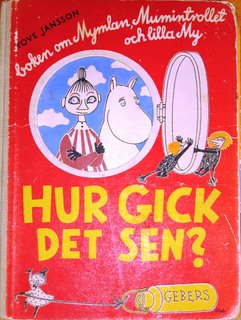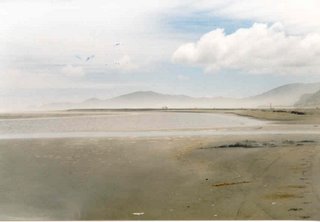Thursday, November 23, 2006

Archipelago Crafts - the result
After a number of working hours a number of boots and bags were produced, in various styles and sizes. Leather and pelts of various kind was used, but the base was seal skin. Traditionally here, the sole of seal skin boots was made by horse skin, with the hairy side out for better grip. The seal skin was then not tanned, just scraped and dried.
Neather is the Inuit way of preparing seal skin proper tanning, but instead the skin is softened physically, by chewing or by using a tool.
The old people in the archipelago still remember how they used to make their own boots. They were warm, and if treated with tar water on the inside, they were quite water resistant too. It seems that the women deserted the seal boots before the men did. Maybe sealskin shoes were too rustic and old-fashioned - girls wanted something more modern and fancy to put on their feet.
Of course,with the coming of rubber boots, the time was up for seal skin footwear.
Wednesday, November 22, 2006

Questions for book addicts
Klimakteriehäxan has challenged her book-reading readers for these questions. So I just had to be the first one to answer them:
1. Latest three books read (more or less): Eriks bok, by Lars Sund. Part three in a great Finlandic epic trilogy about a family in an Ostrobothnian village (and United States). Kalla det vad fan du vill by Marjaneh Bakhtiari. A good candidate for the big Swedish novel of the millennium’s first decade. Numret till Calicut by Calle Hård. A North Swedish/South India crime story, quite catchy.
2. First book ever read: Hur gick det sen? by Tove Jansson. As far as I remember. Yes, the actual one shown above.
3. Very special favorite book: A wizard of Earthsea, obviously. Rather, the whole earthsea trilogy by Ursula LeGuin which is actually five novels and a number of short stories. A very beautiful and immensely sad story. Can only possibly be matched by Jansson's Comet hunt.
4. Favorite genre: Must be fantasy and scifi….or maybe history….or biographies? Also I do read poetry once in a while.
5. Favorite reading time: Long rainy sommer days.
6. Favorite author: Since I already have used Jansson and LeGuin, then…Tolkien? Garcia Marquez? Chatwin? Ekelöf? Tranströmer? No I will say Jayne Anne Phillips, for the short story collections Black tickets and Fast lanes.
7. Book I read right now: We by Jevgenij Zamjatin. A science fiction satire thriller from the Soviet Union’s early 20’s. The author asked Stalin for permission to emigrate to the West, and was allowed this - nothing less than a miracle. Maybe the most remarkable dystopy ever written, Orwell and Boye included. (Actually I started reading The Black Book by Pamuk but that was apparently less exciting since I put it away.)
8. Book I long for to read: Quicksilver by Neal Stephenson. It is lying on my shelf, a beautiful volume. Historical science fiction (I think, I didn’t read it yet), first volume in a trilogy. Recommended on the website of a guy I knew almost forty years ago (so it must be good).
9. Why do I read books? I just can’t stop.
It may seem as if I have something against normal Sweden-Swedish novel writers (as you know, Calle is from Finland, too) - no this is not so at all. Ask me again in a year and I may have a different list.
Tuesday, November 21, 2006
 Archipelago Crafts
Archipelago CraftsWe gathered for a weekend, about 10 people, learning to use seal skins for making traditional boots and bags. Seals are now again hunted in the Baltic Sea and it would be a waste not to use them once they are shot.
Also the meat and blubber can be used for a large number of purposes. Using these products was a large part of coastal culture in the Gulf of Bothnia. Traditions have almost been lost over generations since seals had to be protected to recover from overhunting and environmental poisoning. Now the knowledge has to be recovered and learnt again.
Wednesday, November 08, 2006
 A note on Fame
A note on Fame This is based on my comment on the June 22
Form and matter blog entry ”Elvis and me”.
On his first album, Nick Drake sings:
Fame is but a fruit tree
So very unsound
It can never flourish
'till its stock is in the ground
So men of fame
Can never find a way
'til time has flown
Far from their dying day
This was in 1969 and it did not make him famous. Five years later he died from an overdose of antidepressives, if by accident or by his own will is not known. Now, more than thirty years later, he is praised as a genius and hero, and played all over the musical world. What an irony, isn't it? How right he was, and what a pity, too...
Monday, November 06, 2006
 Interlude: Dylan on Darwin
Interlude: Dylan on DarwinFrom "High Water" (Love and theft album):
Well, George Lewis told the Englishman, the Italian and the Jew
"You can't open your mind, boys
To every conceivable point of view."
They got Charles Darwin trapped out there on Highway Five
Judge says to the High Sheriff,
"I want him dead or alive
Either one, I don't care."
High Water everywhere

The failure of journalism
In a seminar at the local visual culture museum, the honour of international media in relation to reparting on international terrorism and the Middle-East was torn to pieces by the speakers Loretta Napoleoni, Dahr Jamail and Hana Al-Bayaty.
Journalists are not doing their job, not asking the right questions said the Italian economist/writer Loretta Napoleoni. She is on the other hand famous for doing just that. For example, how can terrorist organisations fund their expensive activities? And how does this affect their morals and politics? She has reported on this in books like Modern Jihad and several others.
Dahr Jamail, who is an american journalist was shocked to find how biased the reporting on Iraq by all main American media was, not least by the intelligent strategy of the military's use of "embedded journalists". He has since treaded the dangerous path as independent journalist in Iraq. So has Al-Bayaty, from France/Egypt, by shooting film for example in Fallujah.
Visit the exhibition Contemporary Arab Representations: The Iraqi Equation, at Bildmuseet, Umeå!
Thursday, November 02, 2006

Darwin in Cucao, 1835
Darwin on arriving, noted that “the district of Cucao is the only inhabited part on the whole west coast of Chiloe.” He found it painful to watch how humble the thirty or forty families of Indians that made up the inhabitants. They were treated bad by the rulers, the relative upper-class on Chiloë. Darwins companions treated the Indians as if they were slaves.
Today, the descendants appear to live by renting cabins and camping sites in summer to (mostly) Chilean tourists. The small village was full of little kiosks and bars.
On January 25, Darwin and his company "…rode a few miles northward to Punta Huantamó. The road lay along a very broad beach, on which, even after so many fine days, a terrible surf was breaking. “
He found a strange plant, “…allied, I believe, to Bromelia, and called by the inhabitants Chepones….This plant bears a fruit, in shape like an artichoke, in which a number of seed-vessels are packed: these contain a pleasant sweet pulp…I saw…the Chilotans making chichi, or cider, with this fruit: so true is it, as Humboldt remarks, that almost everywhere man finds means of preparing some kind of beverage from the vegetable kingdom.”
The next day he took the periagua again over the lake, rode back to Castro, and then on to San Carlos de Ancud. He had a great view over the great forest of Chiloë and over the chain of volcanoes on the mainland. “I hope it will be long before I forget this farewell view of the magnificent cordillera fronting Chiloe”, he wrote.
Wednesday, November 01, 2006

Strange but beautiful
The music of Sofia Jernberg (left) and Cecilia Persson is unlike anything else. It is distorted and fragmented but has a strange beauty to it. It is like rolling over all the frequencies on a radio receiver, listening to a lot of odd words and noices. The occasional twinkling of a piano. All of a sudden you stop to listen to a station with funny marimba, tuba and bass clarinet music.
Sofia and Cecilia sang and played, respectively, with their sextet on this year’s Umeå Jazz Fewstival. Much to short beacause everyone wanted to go and listen to some big shot on the main stage. Sofia was also awarded the festival’s main sponsor’s travel grant this year. Very well deserved.
Photo from SR P2